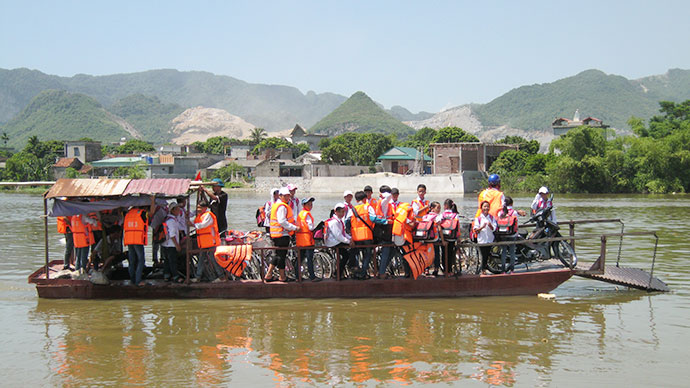By Gwen Straley, Executive Director, 3rd Creek Foundation

3CF made its first impact investment in Nam Thang Long, a company that manufactures life-jacket backpacks which prevent early childhood drowning during monsoon season in Vietnam.
3rd Creek Foundation (3CF) is a small organization, but at just 12% the asset size of the average U.S. private family foundation, it has a big vision: a world without poverty. Since its founding in 2007, 3CF has made grants to small organizations in developing countries around the world who are working to alleviate poverty in their communities. These grants follow the standard 5% annual payout rate mandated for perpetual foundations. To increase impact without spending down principal, 3CF has implemented a strategy to apply more funds toward mission related activity through impact investing. 3CF makes small-sized investments of up to $20K directly in early stage businesses in South Asia and East Africa. This outlay is important because there are roughly thousands of small social enterprises with sound business models that lack access to much needed capital. As mentioned by Capria, early stage enterprises make up the “missing middle,” and are unable to access capital from microfinance institutions, local banks, and most impact investors who make larger sized investments.
It is important for these enterprises to get funding at an early stage because they stimulate the economy at a local level, and a thriving small business sector has the potential to bring communities out of poverty. Early stage enterprises can decrease poverty by providing decent jobs to previously unemployed or underemployed people. This is why 3CF, a foundation focused on poverty alleviation, applies both its grant-making, and impact investing to supporting small and social businesses in impoverished communities.
Managing small-scale international impact investing as a small organization is no easy feat, and 3CF employs the following 3 tactics to make it work:
- Choose locations with respect to social need and investment governance. To ensure impact, 3CF makes investments where rates of extreme poverty are high and where country laws offer international investors some protection. To date, 3CF has made investments in Vietnam and India, and is considering opportunities in East Africa.
- Partner with great organizations. 3CF partners with organizations that are helping to develop the small enterprise sector in target locations. These partnerships help source deals, conduct due diligence, and/or transact the investments. 3CF has partnered with GlobalWA members Thriive and Upaya Social Ventures in Vietnam and India, respectively.
- Leverage existing resources to keep costs low. Minimizing costs is not only a challenge to operate in a global environment, but also essential to our sustainability. 3CF shares intellectual capital from sister organization and Global WA member 3rd Creek Investments, Inc. (3CI), a registered investment advisor that also offers a range of impact investing opportunities for client individuals and organizations. Through this relationship, 3CF benefits from 3CI managers’ financial, accounting, and business expertise, as well as years of experience in international development. 3CF cofounder, Dave Straley, served as Foreign Service Officer and Contractor with USAID for over 23 years prior to starting his investment and accounting business. 3CF has also engaged a network of supporters who donate their time and expertise when needed.
Even when employing these tactics, impact investing in international early stage enterprises presents many risks and challenges. The board is currently poised to allocate 8% of foundation assets to specific businesses with high potential for sustainable poverty alleviation. In addition, 3CF is seeking more capital to commit to small-scale international impact investing, either through direct donations to 3CF or through co-investors.